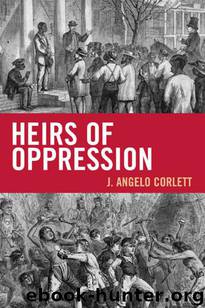Heirs of Oppression by J. Angelo Corlett

Author:J. Angelo Corlett [Corlett, J. Angelo]
Language: eng
Format: epub
Tags: Social Science, Indians of North America, Discrimination & Race Relations, Philosophy, Political, Reparations for Historical Injustices, General, United States, Race Discrimination - United States - History, Indians of North America - Reparations, Race Discrimination, Reparations for Historical Injustices - United States, Reparations, African Americans, African Americans - Reparations, Native American, History
ISBN: 9781442208148
Google: M93NW58lX_YC
Amazon: 1442208147
Barnesnoble: 1442208147
Publisher: Rowman & Littlefield
Published: 2010-11-30T08:00:00+00:00
There can be no future without forgiveness.
—Nelson Mandela1
Reconciliation is a spiritual process, but . . . it must also deal with economics and justice.
—Winona LaDuke2
The United States must fulfill its obligations and right all the injustices that they visited on the original people here before we can collectively move on to the next step that is regeneration and a fruitful future.
—Chief Oren Lyons3
Much has been written in recent years about the moral duty to reconcile matters between surviving victims of oppression and their oppressors. In chapters 2 and 3, various such approaches were explored and found wanting on various counts. Chapters 4 and 5 established both the human right to compensatory reparations and the conditions under which an oppressor-collective qualifies as a liable agent. Chapters 6 and 7 made the cases for reparations for American Indians and blacks. The U.S. government, among certain other agencies or groups, owes such reparations. However, many believe that bygones ought to be bygones, and that compensatory reparations ought not to be paid. Instead, what matters most is harmonious living conditions between the heirs of oppression (both victim heirs and oppressor heirs) in the United States and elsewhere. Forgiving, rather than reparations, is what is required in order to bring genuine peace and tranquility between the heirs of oppression.
But not much, if anything, has been articulated in terms of exactly what is required for reconciliation to occur, or even if it is a good thing for all individuals, groups, or society as a whole. What is reconciliation, and what are the conditions under which it is morally required, or even justified?
FORGIVENESS, RECONCILIATION,
AND REPARATIONS
The philosophical literature on forgiveness reflects at least two general standpoints on social relations. The dominant view of forgiveness is what I shall call a ‘‘reconciliation model’’ according to which the healing of broken relations between a harmful wrongdoer and her victim is the chief goal. According to the ‘‘rectification model’’ of forgiveness, while reconciliation might, at the victim’s choosing, be a by-product of the process of forgiveness, it need not be. On this model, the very possibility of forgiveness is contingent, among other things, on the offender’s providing a genuine apology, which in turn is contingent on her offering, among other things, adequate rectification (including compensation) for her harmful wrongdoing.
A recent proponent of the reconciliation model of forgiveness is Charles Griswold. He argues that the ‘‘reasons’’ for forgiveness consist in (1) ‘‘the wrong-doer’s demonstration that she no longer wishes to stand by herself as the author of those wrongs’’; (2) ‘‘she must repudiate her deeds’’; (3) ‘‘the wrong-doer must experience and express regret at having caused that particular injury to that particular person’’; (4) ‘‘the offender must commit to becoming the sort of person who does not inflict injury’’; and (5) ‘‘the offender must show that she understands, from the injured person’s perspective, the damage done by the injury.’’4 In other words, a ‘‘genuine apology’’ amounts to: ‘‘the taking of responsibility, recognition that the act was wrong, a change of heart sufficient to disavow the action and to say so to the victim .
Download
This site does not store any files on its server. We only index and link to content provided by other sites. Please contact the content providers to delete copyright contents if any and email us, we'll remove relevant links or contents immediately.
| General | Discrimination & Racism |
Nudge - Improving Decisions about Health, Wealth, and Happiness by Thaler Sunstein(7709)
The Fire Next Time by James Baldwin(5449)
iGen by Jean M. Twenge(5417)
Adulting by Kelly Williams Brown(4576)
The Sports Rules Book by Human Kinetics(4389)
The Hacking of the American Mind by Robert H. Lustig(4385)
The Ethical Slut by Janet W. Hardy(4258)
Captivate by Vanessa Van Edwards(3841)
Mummy Knew by Lisa James(3693)
In a Sunburned Country by Bill Bryson(3544)
The Worm at the Core by Sheldon Solomon(3487)
Ants Among Elephants by Sujatha Gidla(3467)
The 48 laws of power by Robert Greene & Joost Elffers(3293)
Suicide: A Study in Sociology by Emile Durkheim(3024)
The Slow Fix: Solve Problems, Work Smarter, and Live Better In a World Addicted to Speed by Carl Honore(3010)
The Tipping Point by Malcolm Gladwell(2927)
Humans of New York by Brandon Stanton(2873)
Get What's Yours for Medicare: Maximize Your Coverage, Minimize Your Costs by Philip Moeller(2746)
Handbook of Forensic Sociology and Psychology by Stephen J. Morewitz & Mark L. Goldstein(2705)
